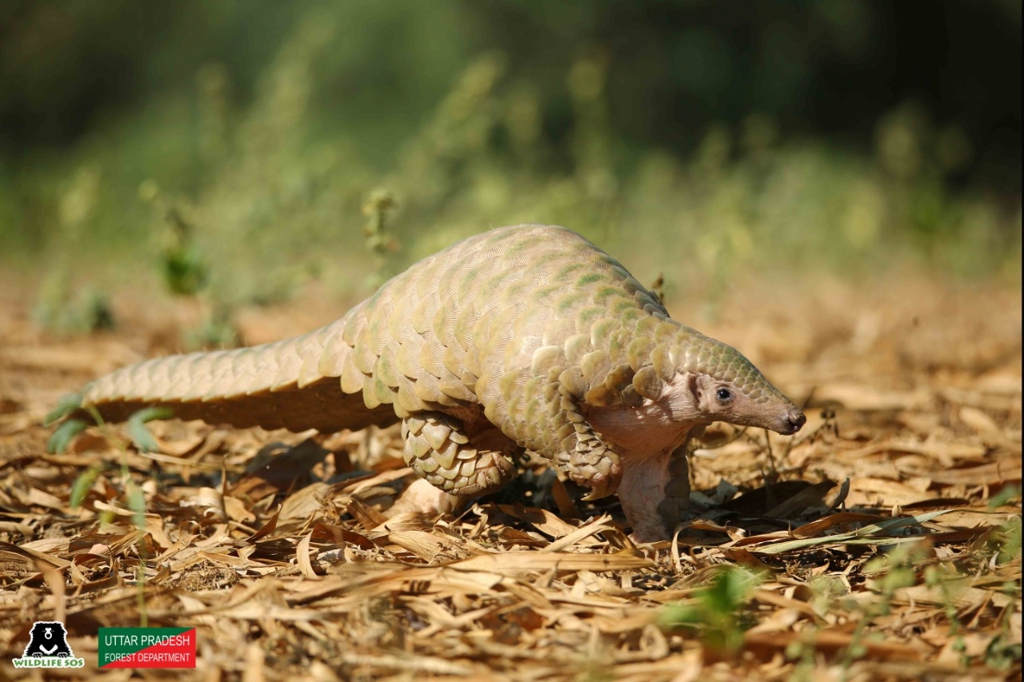

Pangolins are hunted for their meat and scales (IANS)
<p>
On the third Saturday of February every year, hashtags like #SavePangolin campaign flood the social media. This Saturday, we celebrate the tenth World Pangolin Day when all enthusiasts get an opportunity to raise awareness on the plight of these unique mammals.</p>
<p>
While the world is aware about tigers, lions, elephants and rhinos, many people are still oblivious to the existence of the pangolin – a mammal that may well be the most trafficked animal on the planet. On February 18, India&rsquo;s Wildlife Crime Control Bureau seized one live pangolin and seven skins in Assam. Again, on February 14, the Maharashtra Forest department arrested four poachers for pangolin poaching. Last year in November, one pangolin was rescued by the Wildlife SOS team near Agra. In another incident, a poacher was caught with an adult pangolin in Thane, Maharashtra, intending to sell it for a whopping Rs 40 lakhs.</p>
<p>
Investigations reveal that poachers have gone high-tech. They use social media to share videos and pictures with potential buyers, often outside the country.</p>
<p>
The pangolin, a shy and scaly animal, resembles an armadillo and is found in both Africa and Asia. All eight species, four found on each continent, are at risk of extinction. In areas of accelerated human population growth, habitat loss is a grave threat to pangolins besides poaching, which too is a dire threat. Pangolins are slow-moving and roll themselves into a ball if they feel threatened, making them easy targets. Their armour-plated scales can cut and inflict serious wounds on a lion, leopard, or hyena but are no match for a weapon-wielding human.</p>
<p>
Poachers simply pick up pangolins and drop them into a bag. According to a report, poachers kill as many as 2.7 million African pangolins every year. Although pangolins are a protected species in China, there is a thriving black market for pangolin meat, especially for scales, which account for 20 per cent of body weight. Scales are in high demand for use in traditional Chinese medicine. People believe pangolin scales cure arthritis and cancer, improve breast-feeding for lactating mothers, improve blood circulation and enhance male vitality. However, there is no scientific backing for any of these &ldquo;cures.&rdquo; In fact, pangolin scales are made of keratin – the same material in human fingernails.</p>
<p>
Nearly 6,000 pangolins&nbsp; were poached in India between 2009 and 2017 according to a 2018 TRAFFIC India report. Dr Saket Badola, Head of TRAFFIC India said: &ldquo;In recent years, seizure data indicates the distribution, but we do not know their population estimates or trends. What we need to address is the gap in population dynamics. Researchers in India are turning their attention to address gaps.&rdquo;</p>
<p>
Badola told IndiaNarrative.com that Manipur and Tamil Nadu have emerged as hotspots for pangolin smuggling. Those carrying the contraband move it from the southern Indian states to India&rsquo;s border with Myanmar, taking advantage of familial and cultural ties linking these two parts of the country. Pangolins and their scales are smuggled through India&rsquo;s North-Eastern states to Myanmar and then onto China and other countries.</p>
<p>
Pangolin scales are strongly fixed to its body and hunters are known to boil them alive to make these easier to remove. The meat is considered a delicacy but the scales are its most prized body part. A kg of pangolin scales may fetch up to Rs 50,000 in the market. In India, llive pangolins are increasingly being trafficked out of the country.</p>
<p>
There are two species of pangolins in India: the Chinese and the Indian pangolin. Pangolins are the only scaled mammals in the world and were recently declared &ldquo;the world&rsquo;s most trafficked animals&rdquo; by the International Union for the Conservation of Nature (IUCN). A significant amount of trade ends up feeding the illicit international wildlife trade in South-East Asia. The Chinese Pangolin is found in North-East India as well as Bangladesh, Bhutan, Nepal, Myanmar, China, Laos, Taiwan, Thailand, and Viet Nam. Pangolins are covered with scales and the Indian Pangolin has larger scales than the Chinese Pangolin.</p>
<p>
&ldquo;We know pangolins are hunted in this landscape, but systematic information on their occurrence in this region is lacking,&rdquo; said Dr Badola.</p>
<p>
Pangolins are nocturnal and shy, leading a secretive life. They spend most of their life as solitary animals except during mating time. They are insectivorous mammals, feeding on eggs, larvae and adults of ants and termites, thus acting as natural pest control agents. They use their long sticky tongue for feeding on insects and do not possess teeth. They remain inactive and hide in their burrows during day-time. They secrete strong odour through their anal glands for self-defence. Pangolins can consume up to 20,000 ants per day – about 70 million ants per year.</p>
<p>
Pangolins have been included in the Endangered Category by the IUCN and protected under the Wildlife (Protection) Act, 1972. &ldquo;There is a need for awareness among people. Pangolins are harmless and docile but they suffer a gruesome method of illegal harvest. We are on the edge as never before.&rdquo; Said Dr Badola.</p>
Politicians and human rights organizations have called on the European Union (EU) to suspend Pakistan's…
Prime Minister Narendra Modi who is on a State visit to Thailand was gifted the…
Prime Minister Narendra Modi on Thursday held delegation-level talks with his Thai counterpart Paetongtarn Shinawatra…
Adding new vigour to the bilateral friendship, Prime Minister Narendra Modi had a productive meeting…
Defence Minister Rajnath Singh flagged off expeditions to Mount Everest (8,848m) and Mount Kangchenjunga (8,586m)…
The World Uyghur Congress (WUC) has announced the upcoming Third East Turkistan/Uyghur Summit, along with…